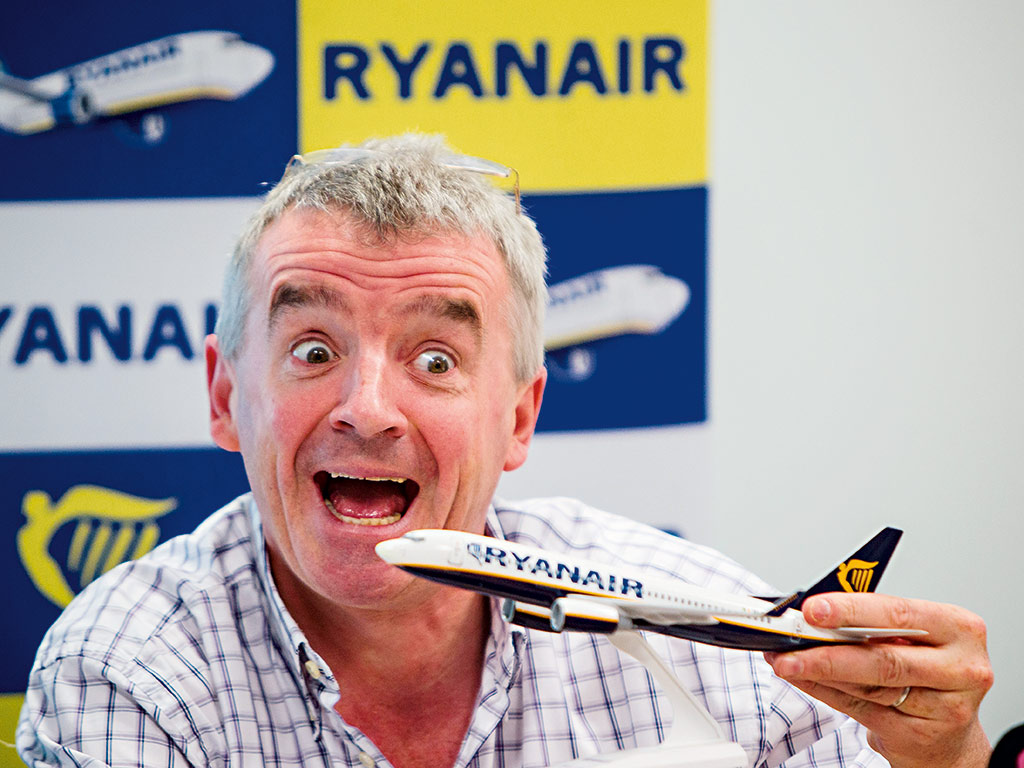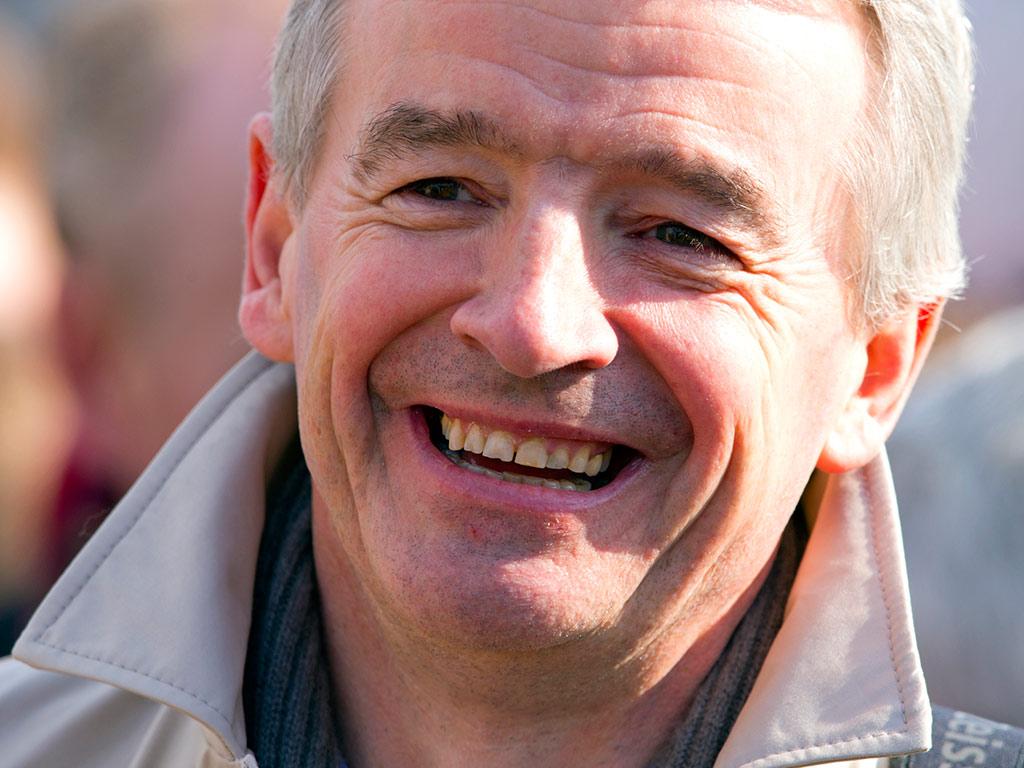
“Michael O’Leary has served as a director of Ryanair since 1988 and a director of Ryanair Holdings since July 1996. He was appointed chief executive officer of Ryanair in 1994,” reads the company website in a dry format that could not be any less in keeping with the Irishman’s nonconformist tendencies. With a wealth of comedy quotes to his name and without the customary straight edge of most in his position, O’Leary is a far cry from the corporate conservatism that so often populates the industry.
The Guardian reported in 2005 that O’Leary adorned his Mercedes Benz with a ‘for hire’ roof plate and taxi meter, enabling him free passage to use the bus lanes on what would otherwise prove a congested journey to Ryanair’s head office. The story was one that riled the public, among them the Irish Taxi Federation’s President John Ussher who told the Irish Independent, “He should get out of the bus lanes and get out of them now.”
Michael O’Leary CV

BORN
1961, Republic of Ireland
EDUCATION
Economic and Social Studies, Trinity College, Dublin
CAREER
1984: Tax consultant, KPMG
1986: Financial Advisor to Tony Ryan
1988: Deputy Chief Executive, Ryanair
1991: Chief Operating Officer, Ryanair
1994: Chief Executive Officer, Ryanair
However, the incident is also one that typifies O’Leary’s regime of cost-cutting and his many encounters with public disapproval. Behind the pantomime villain-like character popularly depicted by the media hides a shrewd business mind and a man whose fortunes have quite appropriately taken to the skies.
Up in the air
The 52-year-old’s public school upbringing and senior standing among five other siblings instilled in the young O’Leary a combative and competitive tendency that remains with him to this day. Born in Ireland’s County Westmeath, O’Leary first studied at the prestigious Jesuit boarding school, Clongowes Wood College and later attended Trinity College in Dublin, only to then join Stokes Kennedy Crowley (later KPMG) as a tax consultant.
After a two-year spell at KPMG, O’Leary profited from past relations with Tony Ryan, a man who had spent much of the 70s and 80s amassing a fortune in the aircraft leasing business and whose sons attended Clongowes alongside O’Leary.
Founded in 1985, Ryan’s Guinness Peat Aviation airline (which was later to be named Ryanair) was tasked with the sole objective of ferrying passengers from Waterford to Gatwick and was meant to offset the reigning duopoly of British Airways and Aer Lingus in the London-Ireland airspace.
Starting out the first year with 25 staff and ending it with 51 was a small success for Ryan; however, the carrier’s glaring shortfalls were apparent for all to see – among them being that pilots had to be less than 5ft 2ins tall to fit in the cabin, according to Ryanair’s website.
To launch the struggling carrier off the ground, Ryan turned to O’Leary, asking that he implement a low-cost strategy and in 1991 shipping him off to Dallas to better understand the successes of Southwest Airlines, the world’s largest low-cost carrier. Then Ryanair’s deputy chief executive, O’Leary came back with the express intention of stripping the carrier to the bone and turning profits by means of innumerable add-ons.
In 2006 The Independent claimed that prospective pilots were required to pay £50 for a Ryanair interview and a further £200 to undertake the simulator check, whereas 2013 incumbents were ordered to slow their speed and cut fuel consumption, according to the Irish Independent.
Streamlined service
The executive has even suggested charging for toilet use and reducing cubicle numbers to one per 189 passengers, in effect making way for an extra six seats. When quizzed by The Guardian on the prospect of charging £5 for a single toilet use, O’Leary retorted, “If someone wanted to pay £5 to go to the toilet I would carry them myself. I would wipe their bums for a fiver.”
The executive’s cost-cutting ideals saw everything from sick bags to seat pockets removed, and baggage fees and in-flight extras ramped up to quite extraordinary degrees. Complimentary products and services were kicked to the curb – save for a laminated safety card in the event of an emergency. Under O’Leary’s new streamlined system flight prices hit a new low, profits hit an all time high, and few lamented the loss of free peanuts.
Ryanair in numbers

1985
Founded
9,000
Employees
€4.3bn
Revenue (2012)
79.3m
Passengers (2012)
1,611
Routes
By 1995, Ryanair had surpassed Aer Lingus and British Airways as the market leader in the London-Dublin flight space, just a year after O’Leary was appointed CEO. In August 2001 Ryanair carried in excess of one million monthly passengers for the first time, and in 2005 ferried more passengers around Europe than British Airways managed across its entire international network, according to Ryanair’s website.
America for 10 bucks
The airline’s full year results for 2013 label the company as Europe’s only existing “ultra-low cost carrier”, being number one for traffic (79.3 million), coverage (1,611 routes from 57 bases), and having registered a 29th consecutive year of growth and record profits. With an average fare of €48 – 71 percent lower than that of second place easyjet’s €82 – it would appear that O’Leary’s streamlined operations are attractive to customers irrespective of his many run-ins with the press.
The millionaire’s ambitions also extend to transatlantic shores. He recently expressed plans to start flying to the US with ticket prices starting at $10 (£6.30) as soon as 2017, he told those attending the World Low Cost Airlines Congress in September. The claim has since aroused an understandable amount of excitement although O’Leary stressed that “we’re not going to do it until we’ve got some planes” and that, “clearly not all fares would be 10 bucks”, according to The Daily Mail.
No matter what your opinion on O’Leary and his methods of amassing his €275m fortune, few can contest the effectiveness of his shoestring strategy over the past two decades. “I don’t give a shit if no-one likes me,” he said according to The Guardian. “I’m not a cloud bunny or an aerosexual. I don’t like aeroplanes. I never wanted to be a pilot like those other platoons of goons who populate the airline industry.”

